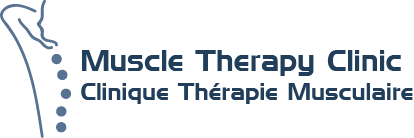Frequently Asked Questions
-
Do you only treat people dealing with pain?
While my focus is on providing pain relief, I also work on preventative care. Whether it’s to help your muscles recover from your workouts or a specific sport you practice, or simply as part of your healthcare to maintain your wellness and reduce stress, regular therapy will help prevent more serious symptoms from developing.
-
How many sessions of muscle therapy will I need to get rid of my pain?
Since muscle therapy is a results-oriented therapy, some may experience incredible pain relief and improved quality of life after only one treatment. However, it really depends on the underlying condition or injury. Someone coming in with a torticollis can usually be regulated in 1-2 sessions. With chronic issues, it usually takes 4-8 sessions before moving on to a maintenance phase.
It is quite simple to figure out if a therapy is working for you or not. If, after a few sessions, you don’t see any improvement, doing more sessions probably won’t help you. Be cautious of any therapy or treatment clinics that try to book you for 20-30 sessions. Understand what works best for you and your body.
-
How often should I schedule a session for maintenance?
It can vary greatly with the individual and it depends on the different factors going on in their life. It can vary from every 2 weeks to every 10 weeks. Maintaining a regular muscle therapy program in addition to a healthy nutrition, regular physical activity, proper sleep, and positive emotional health are the keys to having your body and mind running like a finely tuned machine.
-
I’ve heard you work very deep. I am concerned a session might be too painful for me to handle.
There are two kinds of pain, good and bad. Good pain is when you feel a slight discomfort during pressure on a tight muscle and a soreness afterwards that may last up to 24-48 hours, very similar to having a good workout or trying a new workout your body is not used to. This is known as DOMS (delayed onset muscle soreness). After a muscle therapy session, you will have a similar feeling. However, after a day or two, you should feel much looser, lighter and pain-free or, at the very least, the pain should be considerably less than before receiving the treatment.
Bad pain usually includes a sharp and localized pain or any sudden cracking and popping. Pain that progressively worsens and/or increases over time is a sign of bad pain. This type of pain may require medical attention to diagnose it properly.
Every new client I treat goes through a health assessment. Depending on your particular case, age, health condition, specific prescription medications, and so on, different techniques and pressures are used and adapted to you and your specific condition. The only pain you will be experiencing with me is good pain.
-
Do I need a doctor’s referral?
You do not necessarily need a doctor’s referral. If you have an extended health plan that includes massage therapy coverage, you will have to verify with your particular plan as some require a doctor’s referral and some don’t.
-
Do I need to undress for my treatment?
You will be asked to undress to your comfort level. If undressing is a concern, I use some techniques that do not require oils or lotions. For the typical session, however, I usually suggest to keep the underwear on as I regularly include stretching and different movements, thus making it easier for me to keep you covered at all times. If you are shy and prefer to keep a pair of shorts and your bra on during the session, this will not hinder my work. You will undress in private and place yourself on the treatment table under a flannel sheet and blanket. I will knock before entering room and undrape only areas being worked on.
-
Should I take a session before working out or after?
There are no set rules but, generally, after a workout is the best time to receive a treatment. In addition, I usually advise my clients not to shower for a minimum of a few hours after a session. Some of my unique formulations have anti-inflammatory effects and are best kept on for a while to maximize benefits.
-
I’ve been to a few places that are legitimate and advertise deep-tissue massage. I specifically ask for deep tissue. What I get, however, is a simple relaxation massage like Swedish massage. I understand that some people prefer a relaxing massage but I don’t. Why is it so difficult to find a competent therapist who works the deeper layers of muscle?
This is a very common complaint and, believe it or not, it’s not just athletes and active people who prefer deep work. After having sampled, over the last two decades, quite a few therapists who claim to practice deep work, I can count on one hand the ones who actually delivered a deep-tissue massage.
-
What is your availability?
Monday 12:00 P.M. – 8:00 P.M.
Tuesday12:00 P.M. – 8:00 P.M.
Wednesday – Closed
Thursday 12:00 P.M.- 8:00 P.M.
Friday 9:30 A.M. – 7:30 P.M.
Saturday 9:00 A.M. – 2:00 P.M.
Sunday – Closed -
How fast can I get an appointment?
Usually within 72 hours depending on the specific week and your scheduling flexibility. Earlier hours are usually easier to book faster than peak hours, such as 4:00 P.M. to 8:00 P.M. (after-work hours).
-
How do I book an appointment?
Simply call 514 683-8333. If you get a voicemail, simply leave a brief message with your contact number and you’ll be contacted within 24 hours.
-
Do you offer gift certificates?
Yes, gift certificates are available.

